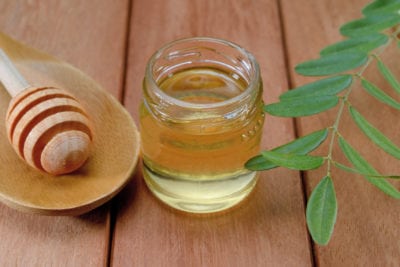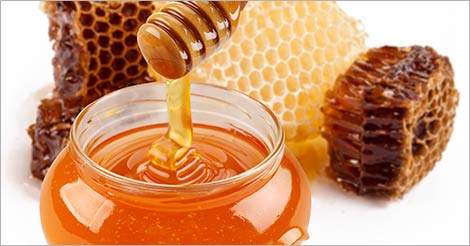Acacia honey and manuka honey are two of the top honey varieties that you’ll hear about today. Health fanatics adore these relatively rare (and often expensive) types of honey because they provide superior health benefits to your average bottle of honey. Plus, acacia honey and manuka honey each have a distinctive taste that make them an interesting ingredient for culinary experiments. The topic of acacia honey vs. manuka honey brings up several important points on what these individual honey varieties have to offer to your diet.
Here, we’ll consider the key differences between acacia honey and manuka honey. While both are undoubtedly delicious and nutritionally impressive, you may find that one can better suit your dietary needs.
Key Differences Between Acacia and Manuka Honey
Nectar
When we dive into the topic of acacia honey vs. manuka honey, we can first look at the source. Acacia honey comes straight from the black locust tree. Found naturally in the United States, but also in areas across Europe, this tree is also called the “false acacia” tree.
Manuka honey, on the other hand, comes from the manuka flower, which is native to New Zealand. The main characteristic separating acacia honey from manuka honey is the plant of origin. The flavor, color, and composition of the honey that bees make will differ enormously when the pollen comes from different plants.
Color
Acacia honey is also paler in color than manuka honey. In fact, acacia honey is lighter than most other types of honey, especially the conventional variety. Some strands of acacia honey may even look completely clear.
Manuka honey is often still light in color when you hold it side by side to conventional honey. But, it’s significantly darker than acacia, with a tone that ranges from light to medium amber. When manuka honey is aged, is darkens in color and its flavor intensifies.

Price
Acacia honey is one of the priciest types of honey that you can buy today. A big reason behind its frustratingly high price is simply supply and demand – acacia honey is one of the, if not the, most popular type of honey around. Another reason behind the high price tag of acacia honey is the labored process it takes to make it. It takes a lot longer to crystallize than other honey types, meaning that it also stays in liquid form for longer (making it more appealing to many honey lovers).
Honey of any kind can’t be mass produced, leading to a relatively high price. Acacia honey may have extended, years-long periods of no production whatsoever – when the honey is rare at these times, it will be even more expensive than usual.
Although manuka honey doesn’t have the same reputation for being expensive as acacia honey, it’s still an expensive product. Since it’s native to New Zealand, manuka honey is harder to come by and takes skilled beekeepers to extract. Plus, honey enthusiasts in other countries will have to work with exchange rates, which may boost prices.
Comparing Health Benefits: Acacia Honey vs. Manuka Honey
When it comes to acacia honey and manuka honey, comparing the health benefits of each is helpful to get a clear idea of their differences. While both acacia honey and manuka offer fantastic perks as part of your healthy diet, certain benefits may be more helpful to you personally than others.

Health Benefits of Acacia Honey
- Antioxidants
One of the top benefits of acacia honey is its incredible antioxidant content. Antioxidants are important to include in your diet because they shield your body from free radical damage. Over time, the negative impact of free radicals can result in disease. If we can lessen that damage with some delicious acacia honey, we may as well do it!
The largest source of antioxidants in acacia honey are flavonoids. It also contains beta carotene, which has been shown to improve skin and brain health.
- Acne Treatment
Acacia honey is used as an ingredient in acne-fighting products. It has high antibacterial activity, which we’ll discuss in more detail below. This can help to keep bacteria out of your pores, leading to less acne and healthier skin.

- Antibacterial
Acacia honey has natural antibacterial benefits. It can create and gradually release hydrogen peroxide, which is extremely effective in killing bacteria. An interesting fact is that acacia honey is known to work against two kinds of bacteria that are immune to antibiotics: Staphylococcus aureus and Pseudomonas aeruginosa.
The antibacterial qualities of acacia honey also make it a great wound healing agent. It may prevent wounds from getting infected and speed up the healing process.
- Metabolism
Acacia honey can act as a metabolism-booster, and may even increase energy levels. This makes it a wonderful addition to diets for weight loss and to support an active lifestyle.
Health Benefits of Manuka Honey
- Antioxidant
Similarly to acacia honey, manuka honey is a great source of antioxidants. This helps fight free radical damage, which can reduce your risk for disease and boost your immune system.
- Antimicrobial
Manuka honey has natural antimicrobial abilities. When something is antimicrobial, it can effectively fight infection. So, manuka honey can help in the prevention and treatment of infections from bacteria, fungi, and viruses.
- Antibacterial
Manuka honey contains Methylglyoxal (MG). This honey component provides exceptional antibacterial benefits that can stop bacterial growth in its tracks. Manuka flowers have a high MG content, so manuka honey has stronger antibacterial effects than other types of honey, including acacia honey.
- Anti-inflammatory
Manuka honey has high anti-inflammatory effects. Anti-inflammatory foods can help with everything from skin health to the prevention of chronic diseases, so we should all work to include as many anti-inflammatory ingredients like manuka honey in our diets as possible.
Conclusion
There you have it: an exploration of acacia honey vs. manuka honey. The source of these honey varieties is responsible for most of their differences. But, as you can tell from the information that we covered, both of these types of honey have much to offer in health benefits, as well as flavor. So, don’t hesitate to try them both – acacia honey and manuka honey can both have a place in your cabinet.




